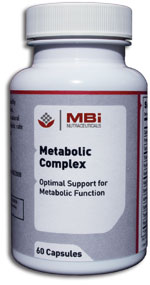Metabolic Complex - 180 CP
NUTRITIONAL FUNCTIONS
Thiamine HCL helps convert carbohydrates into energy.
Pyridoxine is involved in more bodily functions than almost any other single nutrient.
Pantothenic Acid, a B Complex vitamin, is essential for humans and animals for growth, reproduction, and normal physiological functions. It is a precursor of the coenzymes that are involved in more than 100 different metabolic pathways including energy metabolism of carbohydrates, proteins and lipids, and the synthesis of lipids, neurotransmitters, steroid hormones, porphyrins, and hemoglobin.
Kelp contains nearly thirty minerals which nourish the glands, especially the thyroid and pituitary. It helps balance the body's metabolism and the rate at which it burns calories.
Thyroid gland takes iodine, found in many foods, and converts it into thyroid hormones: thyroxine (T4) and triiodothyronine (T3). Thyroid cells are the only cells in the body which can absorb iodine. These cells combine iodine and the amino acid tyrosine to make T3 and T4. T3 and T4 are then released into the blood stream and are transported throughout the body where they control metabolism. Every cell in the body depends upon thyroid hormones for regulation of their metabolism.
Adrenal Tissue is one of the internal secretion producing hormone glands and consists of an outer and inner cortex and medulla. The cortex plays a role in the chemistry of the body which controls metabolism of proteins, fats, and carbohydrates. It also controls the concentration of sodium and potassium in body fluids, stimulates the central nervous system, and exerts metabolic effects on glycogenolysis in the liver and skeletal muscle. It is important for mobilization of free fatty acids and stimulation of the metabolic rate.
Recommendations
As a dietary supplement, take one to two capsules daily following meals or as directed by your health care professional.


